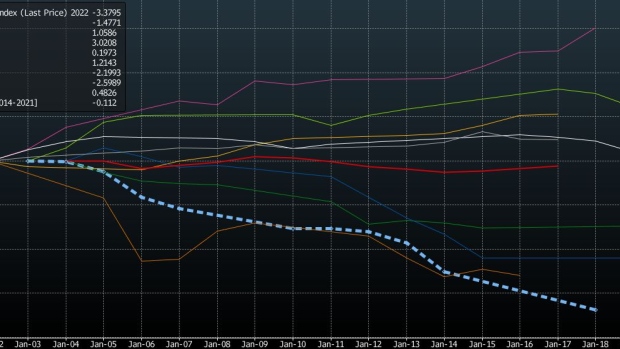
NatWest Beats Estimates on Signs of Growing Customer Confidence
NatWest Group Plc beat earnings estimates in the first quarter as lending and deposits increased amid signs of improving customer confidence.
Latest Videos
The information you requested is not available at this time, please check back again soon.

NatWest Group Plc beat earnings estimates in the first quarter as lending and deposits increased amid signs of improving customer confidence.

Singapore home prices grew at a slower pace last quarter and rents fell, as the city-state’s property boom began to lose steam.

Hong Kong home prices rose for the first time in almost a year in March as the city’s removal of property curbs revived sales.

Greater China’s property market crisis and the challenges it poses for lenders will be on full display on Monday, when embattled developer China Vanke Co. and the region’s biggest banks report earnings.

China’s overseas investment is heading for an eight-year high as its dominant firms build more factories abroad, a shift that could soften criticism of Beijing’s export drive.
Jan 20, 2022
, Bloomberg News

(Bloomberg) -- Sales of junk debt from emerging markets are in the deep freeze as a jump in yields deters companies and governments from pitching deals.
The new year has seen only four bond sales in euros and dollars from high-yield companies while no developing-nation government with a sub-investment grade at S&P Global Ratings or Moody’s Investors Service has so far tapped the market, according to data compiled by Bloomberg as of 5:00 p.m. in London. They raised just $1.4 billion from the sale of debt, down 91% from the same period last year.
The drought stems from the rise in tensions between Russia and the Ukraine, and growing concern over debt levels in countries such as Ghana and Egypt, while U.S. Treasury yields also surge. As investors fret over such trends, the risk premium for emerging-market junk debt has jumped well above the past five-year average.
“Countries wouldn’t want to issue at such levels,” said Richard Segal, a research analyst at London-based Ambrosia Capital. “Investors would view such a market approach as desperation, which could cause a bigger selloff.”
Remain Cautious
With borrowers hesitant to pitch deals, high-yield investors also remain cautious while they nurse losses from last year, when newly-issued debt from emerging nations struggled amid tighter global liquidity and fund outflows.
A Bloomberg index of junk-rated EM debt has had its worst start to a year on record, driving up the average yield by 66 basis points to 7.9%, just shy of the highest level since July 2020.
“Levels and the state of the macro backdrop are not super conducive at this juncture for high-yield issuance,” said Rodica Glavan, head of EM corporate fixed income at Insight Investment Management in London. “The reasons are technicals, little inflows, volatile macro and rates and nervy investors.”
Borrowing Frenzy
This year’s freeze is in contrast to the last two years, when companies and governments sold more than $250 billion. The sale boom was fueled in part by a surge in demand for higher-yielding debt from emerging countries after the pandemic drove rates in the developed world to record lows.
Investment grade deals have fallen a more modest 16% to $29 billion this year. Even so, some of the deals that got done showed signs of the stresses facing the market as the year got underway. EIG Pearl Holdings raised $2.5 billion, downsizing from the $3.5 billion to $4.4 billion it originally planned, while Coca Cola Icecek AS, an Istanbul-based Coca-Cola bottler unit, failed to nudge pricing lower from initial guidance on its $500 million of bonds sold last week.
©2022 Bloomberg L.P.